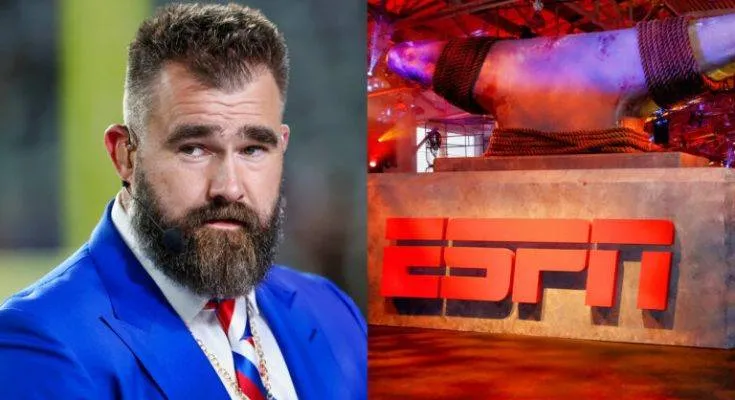In a recent turn of events, Philadelphia Eagles’ center Jason Kelce found himself at the center of a controversy after smashing a fan’s phone during an encounter that quickly escalated. The fan, identified as a Penn State supporter, reportedly used a homophobic slur, which fueled the tense situation. As the story continues to unfold, ESPN has stepped forward with an update regarding Kelce’s future. Here’s what we know about the incident and ESPN’s stance on the outcome.

Understanding the Incident: What Really Happened?
The altercation reportedly began when the Penn State fan approached Kelce with derogatory language, including a homophobic slur. The comment struck a nerve, leading to a heated reaction from Kelce, who ultimately took the fan’s phone and smashed it. Known for his level-headed approach both on and off the field, Kelce’s response has raised eyebrows among fans, media, and sports commentators alike. This action, seemingly out of character, sparked an ongoing debate about athlete behavior and the need for stricter boundaries between fans and public figures.
ESPN Steps In: What’s Their Decision?
According to sources, ESPN has reviewed the situation and made a decision regarding Jason Kelce’s future involvement in upcoming broadcasts. Given that Kelce is a prominent figure in the NFL and a regular voice on sports platforms, ESPN’s approach to his behavior reflects both the seriousness of the incident and the network’s commitment to addressing conduct issues.
Reports indicate that ESPN is opting for a measured response. Rather than issuing a full suspension, the network has allegedly decided on a temporary break for Kelce, allowing him time to reflect on his actions. This short-term hiatus means Kelce won’t be featured on ESPN’s broadcast or live shows in the immediate future. The network’s decision strikes a balance between holding him accountable and recognizing the pressures athletes face when provoked by fans.
The Fine Line Between Fans and Athletes
This incident with Jason Kelce sheds light on an ongoing issue in the sports world: the boundaries between athletes and fans. In the age of social media, athletes are expected to maintain a certain image, but they are also constantly under the microscope. While fans are entitled to engage with their favorite players, there’s a line that, when crossed, can lead to damaging and often irreversible consequences.
In this case, the use of a homophobic slur likely contributed to Kelce’s emotional response. Although many empathize with his reaction, given the nature of the insult, critics argue that public figures like Kelce must find alternative ways to deal with hostility, avoiding situations that escalate into physical confrontations.
ESPN’s Message: Accountability for All
ESPN’s response is not only a reflection on Kelce’s actions but also serves as a reminder to viewers, fans, and athletes about the importance of maintaining respectful behavior. The network’s decision signals a balanced approach, emphasizing that accountability extends to public figures without completely sidelining Kelce. As one of the league’s most respected players, Kelce’s temporary break offers him a chance to reassess his approach to public interactions and prepare for a return that prioritizes professionalism.
ESPN’s handling of this case suggests that they recognize the unique pressures of being in the public eye and the importance of establishing fair, measured responses to situations like these. While not dismissing the incident, ESPN’s actions seem aimed at helping Kelce learn from this experience without permanently damaging his reputation or career.
The Impact on Kelce’s Career and Public Image
While Jason Kelce’s brief hiatus from ESPN may seem minimal, it’s a significant decision that could affect his public image and career trajectory. The Eagles’ center, known for his leadership on the field, has earned widespread respect among fans and teammates. However, this incident may lead some to question his composure, especially in the face of provocations.
From a PR perspective, Kelce’s management team will likely take proactive steps to help him rebuild his public image. This could involve public apologies, outreach efforts, or awareness campaigns focusing on tolerance and respectful conduct. Public perception is a powerful force, and with the right approach, Kelce can use this moment as a learning opportunity and possibly come out stronger and more reflective.
Lessons for Athletes and Public Figures
Jason Kelce’s experience highlights an essential lesson for public figures, especially athletes: they are constantly under scrutiny, and any reaction—even a momentary one—can quickly become a headline. Fans expect a certain degree of decorum from athletes, regardless of provocation, and incidents like this underscore the need for effective communication and boundaries when engaging with the public.
For Kelce and others in similar positions, developing strategies to manage intense situations calmly and responsibly becomes crucial. Whether through personal counseling, anger management, or security protocols, high-profile athletes are encouraged to find support systems to help them navigate difficult encounters without compromising their public image.
Moving Forward: How Jason Kelce Can Rebuild
As Kelce prepares to step back, his focus will likely shift toward self-reflection and regaining the trust of fans and colleagues. By taking proactive steps, he can demonstrate accountability and commitment to handling future conflicts more professionally. Apologizing to the affected parties and promoting mutual respect between athletes and fans could serve as a solid foundation for Kelce’s public return.
Ultimately, Jason Kelce’s situation serves as a reminder of the pressures public figures face and the importance of finding constructive ways to handle difficult moments. With ESPN’s support, Kelce has a valuable opportunity to rebuild and move forward, both for his sake and as a message to the sports community. While this temporary break may feel like a setback, it also presents a unique chance for Kelce to emerge as an even stronger advocate for respect and positive interaction between athletes and fans.
In the long run, Kelce’s experience could serve as a turning point, not just for him but for the sports world in general. By learning from this situation, both athletes and fans can work toward a healthier, more respectful environment for everyone involved.